Struggling with Self-infusion
Written by |

I have a confession: I hate to self-infuse. I am really bad at it. Well, at least most of the time I am. The multitude of blown and missed veins over the past few years have synthesized to wholly deflate my confidence with this critical skill.
Rural hemophilia
I live in a rural area. My nearest hemophilia treatment center is over six hours away. No hospital in my county stocks my factor; I must have my own supply.
I moved here almost four years ago. A few months after I moved, I tripped and fell at 3 a.m. on the way to the bathroom (a whole 20 steps away from my bed). I landed hard. The hard landing was a wake-up call. What was I to do if I hurt myself at night or on a weekend and needed factor VIII replacement? I wrote to my hematologist the next day, and she set me up with a specialty pharmacy. The pharmacy would provide infusion training and factor VIII doses for my home.
Infusion lessons
In May 2016 I received my first lessons in self-infusion. I was 43. On the first day, I spent hours practicing on a fake arm with a vein (I am sure there is a proper term for that, which I do not know). I was pretty good at hitting that vein! Next, I hit an actual vein in the person training me. Then, I had to hit my own vein using one hand. With excellent coaching, I hit my vein on the first try! I then proceeded to blow the next two veins, along with my ego.
For the past three years, I have had ups and downs with infusing. In October 2016 I had to infuse for a real bleed — my hip was injured. With the nurse from the specialty pharmacy on FaceTime, giving me moral support, I infused on the first try. I was so happy! The next few times, I was not successful, and I felt horrible on evenings when I had to toss factor after too many attempts and blown veins.
Factor needs
In March 2017 I had a bad fall. I slipped down a flight of stairs, hitting three metal steps and then the ground on my rear end. The end (no pun intended) result was a buckle fracture of my sacrum. I knew immediately that I had broken a bone because of the pain. There was a swollen strip across my rear end where the stair had hit it; I needed factor and I attempted infusing … 12 times with no success. Two days after the accident, I finally got the factor VIII I needed when my local infusion center inserted a peripheral IV line so I could more easily administer it on my own.
I started to get dependent on IV lines because my infusion attempts did not play out well. For the next year or so, every time I had a bleed, I went to the infusion center and asked for a line to be placed. My confidence had tanked, and I did not want to waste factor VIII or any time with failed infusion attempts. Once in that time frame, after a major surgery, I did self-infuse successfully before heading to the emergency room due to significant post-surgery hemorrhaging. To this day, I am grateful for my success that night. For the subsequent three weeks, I had IV lines in my arm to continue to infuse.
Many men with hemophilia learned how to infuse at camp as children. Many women I know are struggling to learn how to infuse now. When I do infuse successfully, there is a great sense of empowerment and accomplishment. When I blow multiple veins in an infusion attempt, it can be incredibly frustrating.
Continued practice
I do not need to infuse on a daily basis, so I treat “on demand” when I have a bleed. When I am lucky, I can go weeks or even months without infusing. As a result, I do not get as much practice as people on prophylactic treatment. I need to practice more, and it is hard to be motivated to stick myself with needles when I feel fine. This summer, I am going to challenge myself to practice multiple times a week to become more independent with my own care. It is a critical skill to have when you’re far away from a hemophilia treatment center.
I believe in the value of being able to self-administer factor, as needed. I highly encourage my female peers to talk to their care providers about learning to infuse. One day, the skill might save their life.
***
Note: Hemophilia News Today is strictly a news and information website about the disease. It does not provide medical advice, diagnosis, or treatment. This content is not intended to be a substitute for professional medical advice, diagnosis, or treatment. Always seek the advice of your physician or another qualified health provider with any questions you may have regarding a medical condition. Never disregard professional medical advice or delay in seeking it because of something you have read on this website. The opinions expressed in this column are not those of Hemophilia News Today or its parent company, Bionews Services, and are intended to spark discussion about issues pertaining to hemophilia.
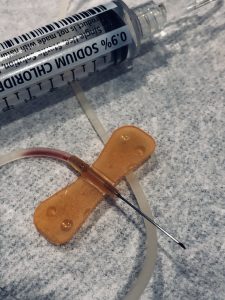
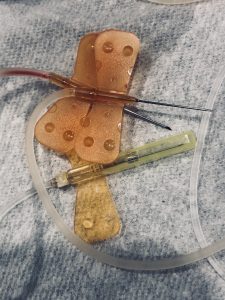
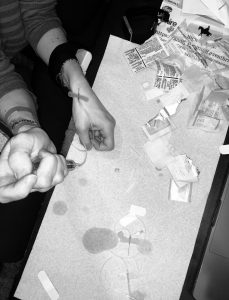
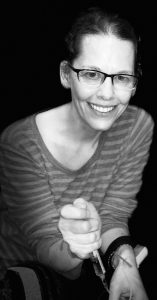
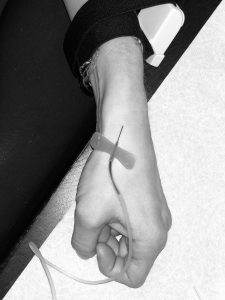



pamela
I read this article to find support and I did. Then I finished reading only to see a lovely familiar face! Shelly and I met at a women with hemo conference in MI a few years back and she is an amazing advocate for women who need factor later in life.
G Shellye Horowitz
You can do it! I promise it gets easier. What a gift to see your comment this evening. You've got this. :)
Here are some tips that may also help: http://hemophilianewstoday.com/2020/05/19/self-infusion-factor-learning-practicing-tips